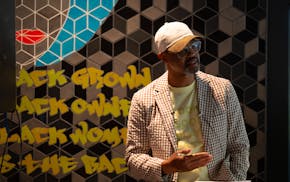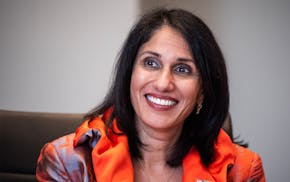SAUK CENTRE, Minn. — There's a shortage of housing throughout Minnesota, but that challenge plays differently in small communities like Sauk Centre, smack in the middle of the state.
In the Twin Cities metro area, developers tussle with city councils over where and how much to build, even in this moment of relatively high interest rates and tariff-induced slowdown. In places like Sauk Centre, population 4,600, there are no developers trying to build something.
Two years ago, the Sauk Centre City Council decided the city would become its own developer.
It bought 45 acres on the edge of town from a retiree who for years had contemplated doing some kind of development with the land. No one objected and the town's biggest employer, Felling Trailers, pitched in some money to help with the purchase.
"People were kind of happy we were doing things," said Vicki Willer, city administrator in Sauk Centre.
Nine of the first 19 lots sold at prices from $24,000 to $26,000. Two purchasers already finished building houses.
Sauk Centre is one of several communities around the state that are taking development upon themselves. It's the kind of doing-what's-needed enterprise that some of Minnesota's small towns have also shown with another community need — child care centers — in recent years.
Wadena, about 50 miles north of Sauk Centre, in 2022 purchased some land on the edge of town and platted out 41 lots. Ten now have houses on them.
Freeport, Warren and Ada, all in the central and northwest part of the state, have undertaken smaller expansions with the town acting as the initial developer.
"Small cities are having to be a lot more creative because the developers just aren't pounding on their door," said Cap O'Rourke, executive director of the Minnesota Association of Small Cities.
He said developers typically need a project size that's larger than what a community under 5,000 people can deliver to meet their profit expectations.
However, even small, slow-growing communities need someone to take a chance on development, particularly so their local businesses and manufacturers can attract and retain workers.
"Our goal is to support our businesses with housing," Willer said.
She dug out a design for the acreage a private developer had made decades ago. She had it updated into a four-phase buildout plan. Last summer, crews added water, sewer, utilities and roads for the first phase.
"We platted the first section at 19 lots. I thought, if we sell five in the first year, I'll be happy. We sold nine," Willer said. Construction will soon begin on five homes.
If this level of interest continues, Willer said the city may start on the second phase later this year. When complete, the entire project could have around 80 new homes, including some twin homes.
"We kind of have it ghost-platted for 80, but then as we develop each section, we find we end up moving the lines and making the lots a little bigger," Willer said.
Sauk Centre has spent $1.8 million on its project so far, including the land purchase and first-phase improvements. It hasn't used taxpayer funds. It relied mainly on a loan to itself secured by revenue it gets from the lease of the local hospital to the St. Cloud-based health provider CentraCare.
Best known as the hometown of novelist Sinclair Lewis, Sauk Centre is a far different community than it was a century ago, when it was an agricultural center and the setting of his famous novel "Main Street."
The town still attracts Lewis fans to his boyhood home and the small hotel where he worked before he became famous. It has labeled its own main street "Original Main Street."
Today, the community is a busy stop along I-94 about halfway between St. Cloud and Alexandria and home to several manufacturers. The biggest is Felling, a maker of commercial, construction, utility and custom trailers.
The company's chief executive, Brenda Jennissen, said most employees live in town but some commute from 30 or 45 minutes away. Over the years, though, the company noticed more and more potential hires were turning the company down because of a lack of housing options.
"It was just frustrating. We'd love to hire them," Jennissen said. She even spoke to the builder of an apartment complex in Alexandria about doing a project in Sauk Centre.
"I'm in the trailer business," she said. "I don't want to be in the housing business. That's how this came to be. We decided, let's help the city make this purchase."
She and Willer both said they expect some Sauk Centre residents to build new homes in the addition, opening up some existing houses for younger buyers. "Then it would be a domino effect," Jennissen said.
Willer noted the city in recent years also purchased land near the interstate for a commercial development and its second industrial park, then sold it off.
"Our goal is not to compete with any private development," she said. "It's just that it wasn't happening."

Ramstad: Minneapolis' Camden neighborhood is rising. Houston White wants to keep it that way.

Ramstad: Minnesota's big businesses are in crisis with a common problem

Ramstad: No business can 'eat' all the tariffs, not even Walmart

Ramstad: Donaldson is protected from tariff chaos after expanding globally the right way


